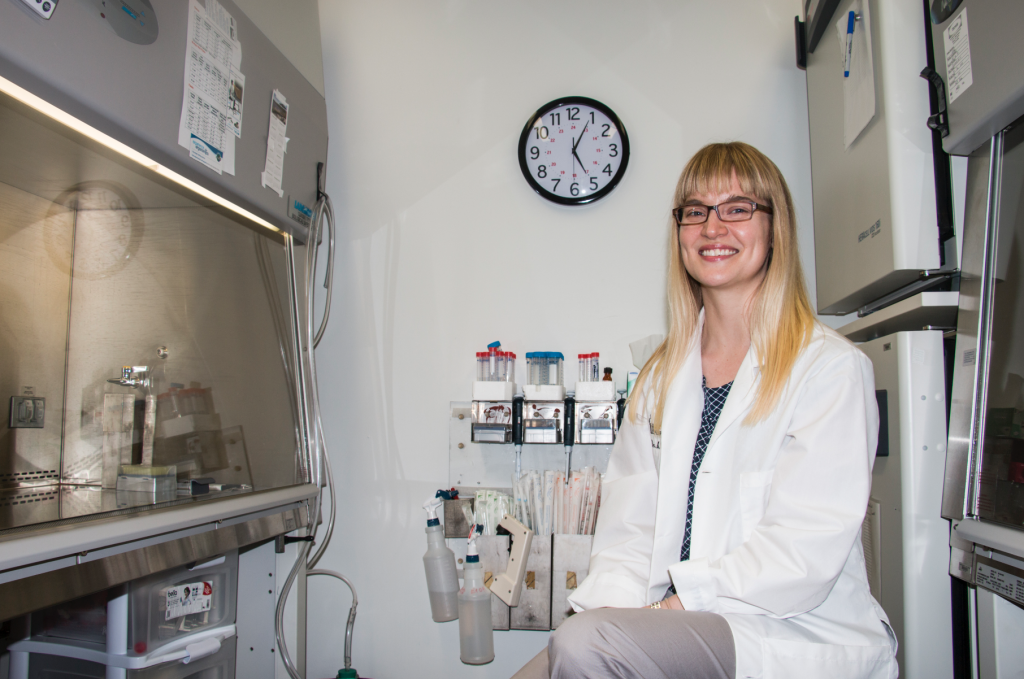A team of University of Iowa researchers is looking for answers to psychiatric disorders at its most foundational level by programming skin cells into brain cells
Trained in both medicine and neuroscience, Aislinn Williams, a UI assistant professor of psychiatry, developed a career by being intrigued by how the brain controls behavior.
“The brain drives behavior, and [it] goes awry when the brain is not functioning properly,” she said.
She brings these two areas together in her lab — studying psychiatric disease by converting human skin cells to stem cells and then programming them to brain cells (neurons).
“It is fascinating that we can generate neurons from a person who is sitting right in front of you,” Williams said. “[With stem cells], we can understand how these neurons might have differences in responding to chemical stressors, how they develop, or the way that they communicate with each other … it is a window into the brain while this person is still alive.”
Williams’ lab focuses on stem cells to understand how psychiatric-risk genes change cell function and how they work in a network. While current research has identified genes that affect psychiatric disease, Williams intends on understanding how the risk-factor genes affect neurons.
One of the risk factors is in a voltage gated channel, a protein that reacts and regulates electric activity between neurons.
“These voltage gated channels have been linked to many psychiatric diseases, including bipolar disorder, schizophrenia, autism, ADHD, and major depression … we look at how variation changes how the gene is expressed,” Williams said.
Researchers make tools in the lab to shut down the protein from becoming functional.
“We use CRISPR [gene] to create modifications in the [voltage gated] channel and edit the gene … and then transfer over this difference to the stem cells,” said Krislen Tison, a graduate student in the Interdisciplinary Program of Genetics.
Mice models are used to further study the effect of the voltage gated channel genes.
“Mice models really enable us to drill down to the basic core biology of disease,” Williams said. “It is really exciting that we could understanding something about humans from these careful mice models … such as changes in genes being the same changes seen in humans.”
Changes in mice behavior can be seen with an increase or decrease in this protein.
“We can’t ask a mouse if it is depressed or happy, but we are able to see changes in learning,” Williams said.
The protein change affects complex learning tasks, requiring more time to complete. Using both cellular and animal models, the Williams lab tackles fundamental mysteries of psychiatric disease.
“We are trying to understand what goes wrong in bipolar disorder and schizophrenia,” Williams said. “This is still an open question. We know symptoms, how [patients] suffer, but we have a limited palette of treatments to choose from.”
Most psychiatric treatments are discovered by accident.
“There hasn’t been any groundbreaking medication or pharmaceutical advancement for these psychiatric conditions,” Tison said.
The treatment medications are often tweaked over time.
“This variation has given us lots of medications that do similar things but leaves behind people who never responded to treatment or experience side effects,” Williams said.
Williams’ lab hopes to contribute to the psychiatric knowledge base by using genetic data to learn what occurs at the functional molecular level.
“The field of psychiatric care is on everyone’s mind,” said Anthony Thompson, a UI research assistant in Williams lab. “We come with a positive approach … it is very promising if we can help [others].”







